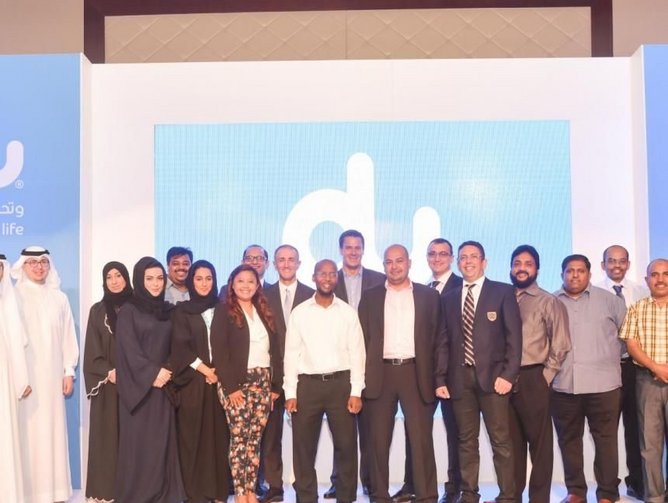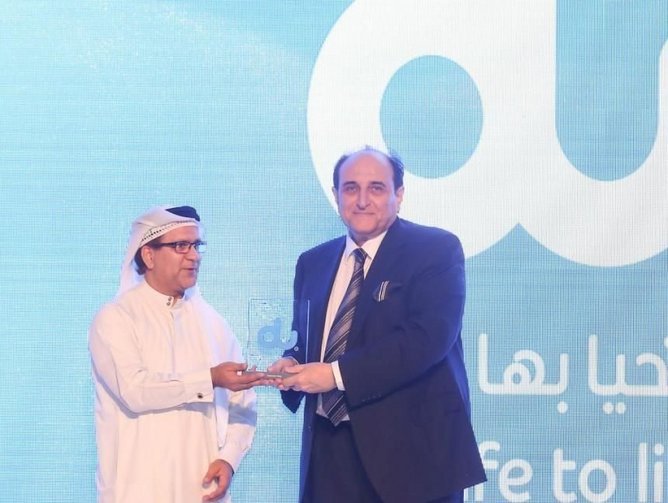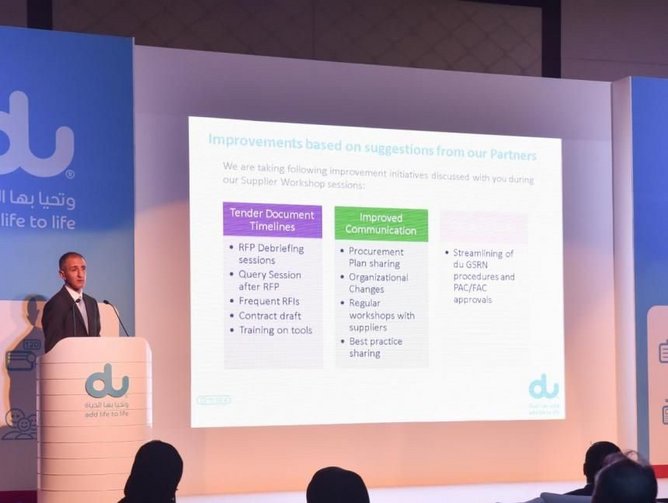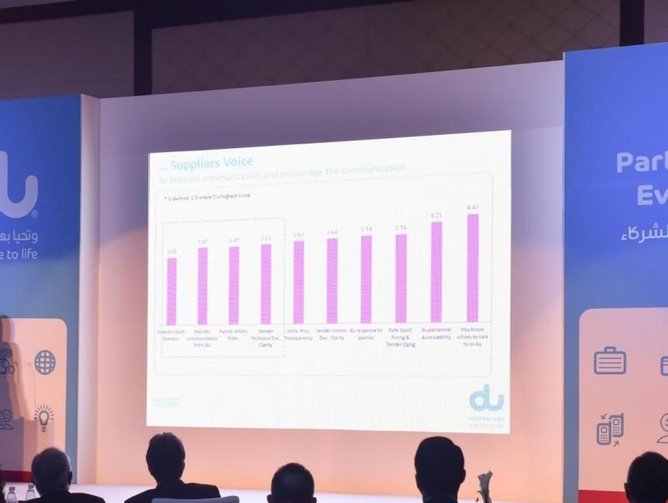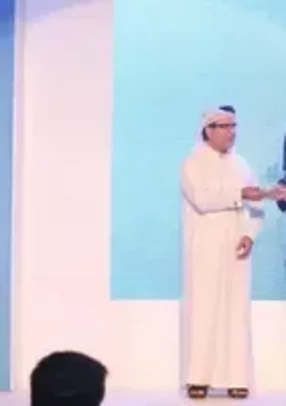In 2006, the thought of starting a new telco in the UAE - a country where mobile market penetration was already over 120 percent - and competing against a very strong incumbent player while growing to take almost 50 percent mobile market share may have seemed unthinkable. Fast forward seven years and du has achieved precisely this.
With a mission to bring people and businesses together by offering mobile and fixed telephony, IPTV and broadband to homes and offices, du now conducts over AED 12 billion’s worth of vital communications work a year with a strong EBITA of AED 5.4 billion.
This translates into 7.7 million mobile customers, with 674,000 fixed line subscribers on its books. Mobile data exceeded 33 percent of its total Mobile revenues. Delivering its broad scope of services is a 1,700-strong workforce, comprising nationals of more than 60 countries from around the world – a global team of experts.
Now the company is embarking on its most ambitious project to date. Dubai Smart City will connect residents, business and government in ways never seen before, leveraging the power of the Internet of Things to enhance usability and efficiency of vital services spanning utilities, parking and health. It will also contribute to achieve the vision of Dubai’s ruler and Vice President of the UAE, His Highness Sheikh Mohamed Bin Rashid Al Maktoum, to transform Dubai into the smartest and happiest city in the world.
Lift off
Playing a key strategic part in du’s journey from the beginning has been Anis Tabka, Senior Vice President – Sourcing, Contracts & Supply Chain Management. Vital areas that have been developed by Tabka, allowing the company to grow so impressively, are its procurement and strategic sourcing strategy, end-to-end supply chain experience and positive attitude towards supporting the business to meet its needs while enforcing corporate governance.
Tabka, who has 21 years of experience in the telecoms trade, mostly in the USA and Germany with Siemens on the commercial side, emphasises the importance that finding the right expertise to work with both internally and externally has had on business development.
“Traditionally the industry in the MENA area was not well-equipped in terms of expertise,” he explains. “When I came in 2005 most of the professionals I was sourcing in the region came from other functions. One of the biggest challenges I faced was finding technical procurement professionals who are familiar with the telco world and having the business thinking on how it is important to look at the whole value chain whenever negotiating deals rather than just focusing on price negotiation.
“I was able to convince my management of the value of putting a strategic spend category strategy matching our corporate roadmap and also of the benefits of partnering with some strategic vendors can bring. We needed a proper procurement strategy and a Supplier Relationship Management (SRM) methodology put in place and Executive Management allowed us to run with it and make it happen.”
This has paid off and du was the first Telco in the Middle East to get awarded in 2010 the prestigious Chartered Institute of Procurement & Supply award from the UK.
Going above and beyond the norm in corporate governance has also allowed du to stand out in what was an extremely saturated and monopolised telecoms market in the UAE.
Three core values lay at the heart of du’s corporate governance system: friendly, honest and confident, with an emphasis on nurturing responsible practice and accountability which will result in sustainable business. Underpinning this is a strong code of ethics set by the Board of Directors, with business objectives based on community and national development needs.
Dubai Smart City
This is no better demonstrated than by du’s work to turn Dubai into a smart city. The UAE has one of the highest mobile penetration rates in the world, and Dubai is witnessing a steady population growth, making the need to be ‘smart’ all the more pressing.
Du has been selected as strategic partner to the government’s Smart Dubai Office, responsible for implementing and managing the smart city platform. “This will be the first of its kind in the world,” Tabka says. “All services and applications will be connected and running together so the citizens of Dubai will be able to make better use of their data.
“For example, someone about to leave their home will be able to find out exactly where to park and the best route to get there before they get in the car. Many of the smart cities around the world have deployed separate IoT applications such as smart homes, smart metering and smart transport, but none have integrated as many used cases under one centralised digital platform as Dubai. Du will be hosting such a platform and managing it on behalf of the city.”
The project aims to establish collaboration in six ‘smart’ focus areas: smart life, smart transportation, smart society, smart economy, smart governance and smart environment, guided by principles of communication, integration and cooperation.
Du will be responsible for creating one common infrastructure from which all smart services can grow and interact, bringing the city’s data into one place in a secure environment, introducing best-of-breed smart services, all designed to work together and sharing data that brings a new level of insight to Dubai to benefit the public, entrepreneurs and government.
Such non-traditional telco work also requires Tabka to realign his sourcing strategy.
Tabka explains: “Major Telcos are having to look into other revenue alternatives such as digital business as revenues in their traditional core services are flattening; that’s why our management has decided to set up a new Digital Business Unit to boost our cloud products and complex Managed Services offerings in the market.
“Our Dubai Smart City project is a perfect example of this. This does not involve a traditional sourcing strategy nor the traditional large proprietary software players we are used to. The Big Data and IoT worlds are challenging our Modis Operandi: it’s now all about Open Source software vendors, SaaS (software as a Service) solutions, Cloud services and strong systems integration. We worked very closely with our technical colleagues to find the best in class partners to meet Smart Dubai requirements and use our experience to integrate it all together and deliver a complex project such as this.
“There are far more joint ventures, partnerships, revenue shares and corporations working together to deliver this strategic project in the long term. We all drive to deliver the best services and evaluate each other much more closely and in much greater detail, as we are both taking risks. These are very close relationships that involve constant communication and flexibility from both sides and HPE [Hewlett-Packard Enterprises], our main partner and system integrator for the Dubai Smart City project, is a good example.”
Du’s smart city credentials are already in evidence, shown by its city-wide public WiFi provision and smart street lights, using motion sensors to increase visibility when vehicles approach. However, integration of app-based services on this scale presents a larger set of challenges to overcome.
“We need to be flexible on how we put this huge ecosystem in place, and my job is to help bring all the different component parts together in the best way,” Tabka adds. “How do we set up revenue sharing, who do we choose to partner with, how do we optimise costing for du and the City?
“We need to convince partners to invest in this as a long term partnership, and we also need to convince the providers of existing smart technology in the city that an integrated approach is the way forward. There will be changes, there will be challenges.
“For example, security is one of the biggest challenges facing us. The hackers out there are only going to get smarter. We are going to be seeing all the traffic and data from all of these different government functions and services provided by private entities – electricity, parking, home consumptions, supermarket shopping. How do you secure this and not endanger the integrity of the customer’s data we are integrating? It’s a big challenge and we are working with our main partners the Smart Dubai Office, Dubai Data Establishment and our community of selected technology partners to bring the best suited solutions to secure this.”
Track record
Based on du’s recent track record in innovation and service delivery, the challenges presented by Dubai Smart City will no doubt be overcome.
In March, du won ‘Security Implementation of the Year’ at the 2016 Network Middle East Innovation Awards for its Secure Web Hosting in the cloud. The company was also recognised for Best Enterprise Mobility Solutions and the Best Cloud Security Solutions at the inaugural Cloud MENA Awards 2016 in April.
In terms of delivering a value for money service, du announced earlier this year that it is reducing its GCC roaming charges, offering more affordable connectivity and communication for customers as they travel for business and leisure. Customers can also benefit from a joint venture with Ticketmaster, receiving a 15 percent discount on some of the region’s biggest events.
These end user benefits would not be possible without the work of key partners in day-to-day activities, and Tabka is eager to emphasise the many positive working relations du has with other businesses, and how important these will be in the future.
He adds: “Aramex, for example, are our main logistics provider helping us from traditional warehouse operations to distribution channels, fulfilment and end-to-end customer activation. They are going through their own digital transformation and are embracing the concept of crowd sourcing more and more. We are very happy to be working with innovative companies such as Aramex. Our other key partners include HPE, Huawei, Atos and Cisco.
“As for the future, we will be growing more and more and we will need new technology partners embracing the world of Open Source and innovations to add to the business. I would love to get involved with more exciting new projects like the Smart City, opening up new areas and opportunities for growth.”
